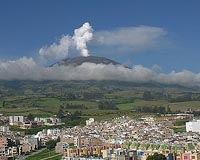| . |  |
. |
Champaign IL (SPX) Nov 24, 2009 A new study provides "incontrovertible evidence" that the volcanic super-eruption of Toba on the island of Sumatra about 73,000 years ago deforested much of central India, some 3,000 miles from the epicenter, researchers report. The volcano ejected an estimated 800 cubic kilometers of ash into the atmosphere, leaving a crater (now the world's largest volcanic lake) that is 100 kilometers long and 35 kilometers wide. Ash from the event has been found in India, the Indian Ocean, the Bay of Bengal and the South China Sea. The bright ash reflected sunlight off the landscape, and volcanic sulfur aerosols impeded solar radiation for six years, initiating an "Instant Ice Age" that - according to evidence in ice cores taken in Greenland - lasted about 1,800 years. During this instant ice age, temperatures dropped by as much as 16 degrees centigrade (28 degrees Fahrenheit), said University of Illinois anthropology professor Stanley Ambrose, a principal investigator on the new study with professor Martin A.J. Williams, of the University of Adelaide. Williams, who discovered a layer of Toba ash in central India in 1980, led the research. The climactic effects of Toba have been a source of controversy for years, as is its impact on human populations. In 1998, Ambrose proposed in the Journal of Human Evolution that the effects of the Toba eruption and the Ice Age that followed could explain the apparent bottleneck in human populations that geneticists believe occurred between 50,000 and 100,000 years ago. The lack of genetic diversity among humans alive today suggests that during this time period humans came very close to becoming extinct. To address the limited evidence of the terrestrial effects of Toba, Ambrose and his colleagues pursued two lines of research: They analyzed pollen from a marine core in the Bay of Bengal that included a layer of ash from the Toba eruption, and they looked at carbon isotope ratios in fossil soil carbonates taken from directly above and below the Toba ash in three locations in central India. Carbon isotopes reflect the type of vegetation that existed at a given locale and time. Heavily forested regions leave carbon isotope fingerprints that are distinct from those of grasses or grassy woodlands. Both lines of evidence revealed a distinct change in the type of vegetation in India immediately after the Toba eruption, the researchers report. The pollen analysis indicated a shift to a "more open vegetation cover and reduced representation of ferns, particularly in the first 5 to 7 centimeters above the Toba ash," they wrote in the journal Palaeogeography, Palaeoclimatology, Palaeoecology. The change in vegetation and the loss of ferns, which grow best in humid conditions, they wrote, "would suggest significantly drier conditions in this region for at least one thousand years after the Toba eruption." The dryness probably also indicates a drop in temperature, Ambrose said, "because when you turn down the temperature you also turn down the rainfall." The carbon isotope analysis showed that forests covered central India when the eruption occurred, but wooded to open grassland predominated for at least 1,000 years after the eruption. "This is unambiguous evidence that Toba caused deforestation in the tropics for a long time," Ambrose said. This disaster may have forced the ancestors of modern humans to adopt new cooperative strategies for survival that eventually permitted them to replace neandertals and other archaic human species, he said. Share This Article With Planet Earth
Related Links University of Illinois at Urbana-Champaign Bringing Order To A World Of Disasters When the Earth Quakes A world of storm and tempest
 Colombia volcano eruption subsides, evacuation continues
Colombia volcano eruption subsides, evacuation continuesBogota (AFP) Nov 21, 2009 A volcanic eruption has eased enough to allow a local airport to open, but thousands of people are staying clear of Colombia's most active volcano as more activity is feared, authorities warned Sunday. Ashes are still falling near the Galeras vocano in the south, after Friday's eruption, but a color-coded alert has been lowered from red to orange, the Colombia Institute of Geology and Mining ... read more |
|
| The content herein, unless otherwise known to be public domain, are Copyright 1995-2009 - SpaceDaily. AFP and UPI Wire Stories are copyright Agence France-Presse and United Press International. ESA Portal Reports are copyright European Space Agency. All NASA sourced material is public domain. Additional copyrights may apply in whole or part to other bona fide parties. Advertising does not imply endorsement,agreement or approval of any opinions, statements or information provided by SpaceDaily on any Web page published or hosted by SpaceDaily. Privacy Statement |